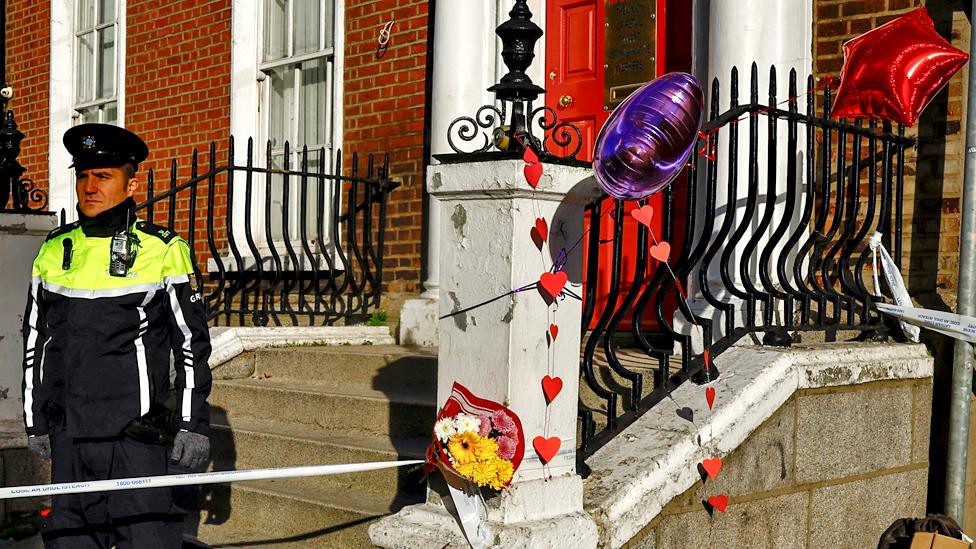Dublin riot saw most riot police deployed in Irish state history
- Published
Watch: Cars torched and shops looted in violent Dublin riots
The most riot police in Irish history were deployed to deal with Thursday's street violence in Dublin, the country's justice minister has said.
Helen McEntee praised the police response to a riot which began following a knife attack in the city.
Three children and a school care assistant were stabbed outside a primary school several hours earlier.
Sinn Féin - the largest opposition party - criticised the police response to the riot.
While its leader Mary Lou McDonald backed individual gardaí (police), she called for the commissioner of the force to resign.
Taoiseach (Irish Prime Minister) Leo Varadkar said about 500 people were involved in the disorder, adding that they had "brought shame" on Ireland and promising new laws within weeks to bring those involved to justice.
Officers arrested 34 people after vehicles were set on fire and shops looted.
A large police presence remains in Dublin's city centre on Friday night and a number of arrests have been made following sporadic altercations on O'Connell Street.
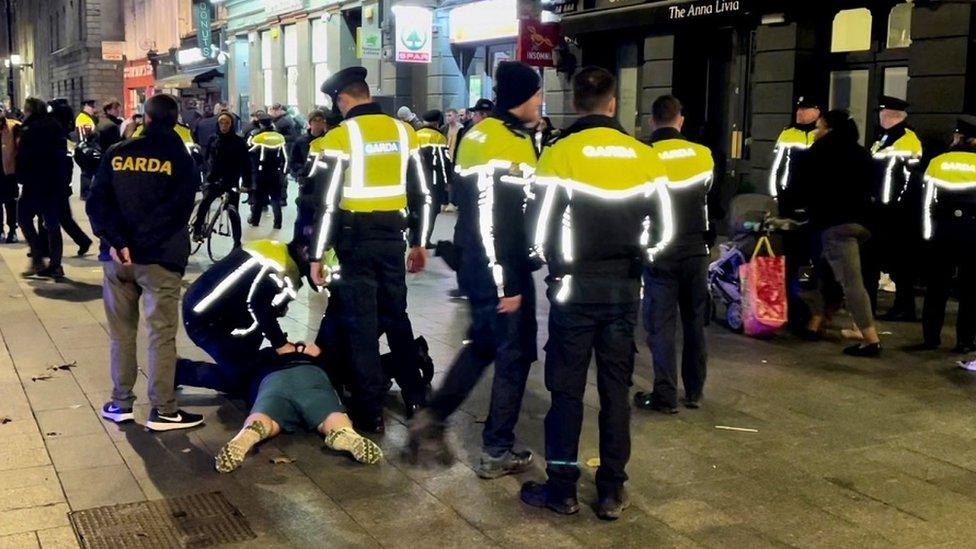
Police detain a man on O'Connell Street in Dublin on Friday - a huge police presence remains on the streets following Thursday's riot
Ireland's police chief Drew Harris blamed the rioting on a "lunatic, hooligan faction driven by a far-right ideology".
Two of the five people injured in the stabbings outside a primary school, Gaelscoil Choláiste Mhuir, on Parnell Square are critically ill.
They include a five-year-old girl and a school care assistant who "used her body as a shield" in an attempt to protect children from the attacker.
Irish police chief Drew Harris condemns the scenes of violence in Dublin city centre
A man in his late 40s who was also seriously injured is a person of interest, according to police.
They said they were not looking for anyone else in relation to the stabbings and were following a definite line of inquiry.
In a statement, the school said it is "deeply shocked and saddened" by the incident and that its thoughts are with the pupils and creche worker who were injured.
"Offers of support have been pouring in and are greatly appreciated," it added.
Why did the Dublin riot happen?
Just hours after the knife attack, rioters destroyed 11 police vehicles, while 13 shops were badly damaged and more were looted during clashes with riot police.
Three buses and a tram were also destroyed and several police officers were injured during over three hours of sustained violence.
Two Police Service of Northern Ireland (PSNI) water cannon vehicles are being sent across the border, following a request from Irish police.
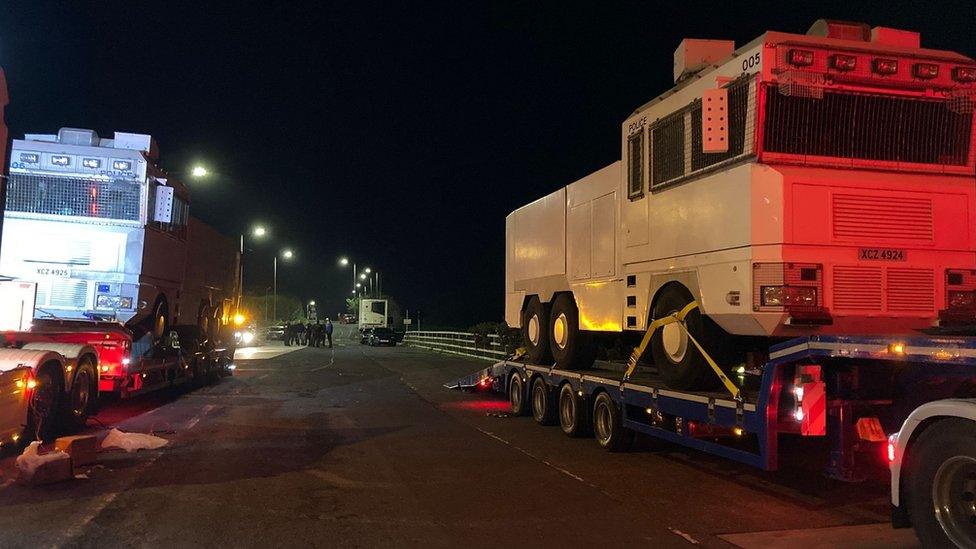
Two Police Service of Northern Ireland water cannon travelled to Dublin on Friday after a request from Irish police
The PSNI said they would be solely operated by An Garda Siochána (Irish police) officers.
The "extraordinary outbreak of violence" had come after "hateful assumptions" were made based on material circulating online in the wake of the stabbings, Garda Commissioner Drew Harris said.
It is understood that included false claims that the attacker was a foreign national.
Sources have indicated to the BBC that the man suspected of carrying out the attack is an Irish citizen who has lived in the country for 20 years.
"These are scenes that we have not seen in decades," said the Garda commissioner.
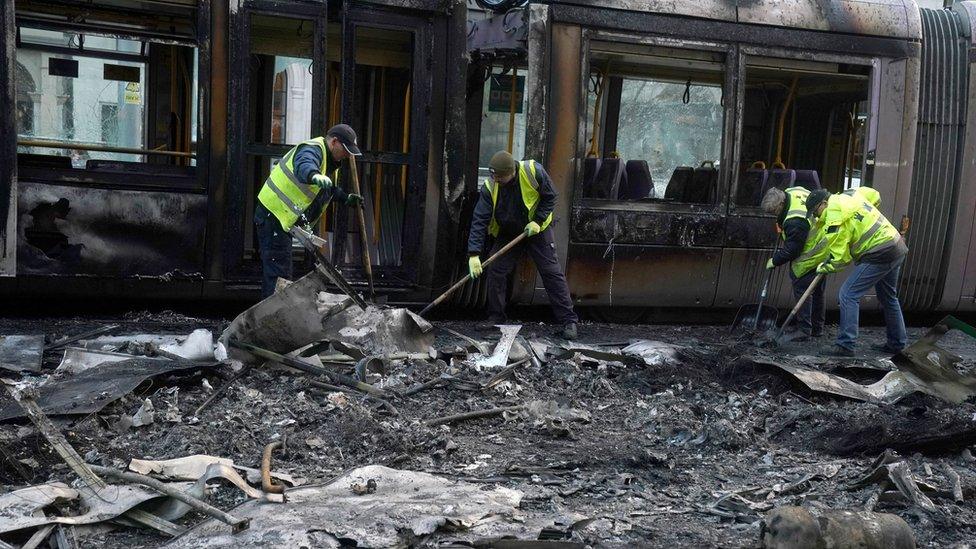
A tram was burnt out on O'Connell Street in central Dublin during the rioting
"What is clear is that people have been radicalised through social media."
Thirty-two people have since appeared in court in Dublin in connection with the riot.
The accused - 28 men and four women - face charges including weapons offences, public order offences and theft of items such as clothing and cigarettes.


After the stabbings, rumours spread on the WhatsApp, Telegram and Signal messaging apps and far-right agitators decided they would protest at the crime scene.
But that escalated into violence and the rioters, including children and young adults, soon took over a large area of Dublin city centre.
For months there has been real concern that something like this could happen.
The far right in the Republic of Ireland has grown and become incredibly emboldened, recently holding a protest outside the Irish parliament.
But the violence on Thursday night was on a level not seen in Dublin in decades and has left the people of the city reeling.

The Dublin Fire Brigade said a fire engine that attended the stabbing scene was later attacked by rioters.
Geoff McEvoy from the fire service said: "One of the first calls that truck responded to [after the stabbings] was a petrol bombing of a refugee centre."
He said "the truck was pelted with projectiles" and "beaten with iron implements" while its crew dealt with that incident.
'Nation unsettled and afraid'
Under questioning from reporters, Commissioner Harris denied that his police force had failed to protect Dubliners and their city from the violence.
"We could not have anticipated that in response to a terrible crime - the stabbing of school children and their teacher - this would be the response," he said.
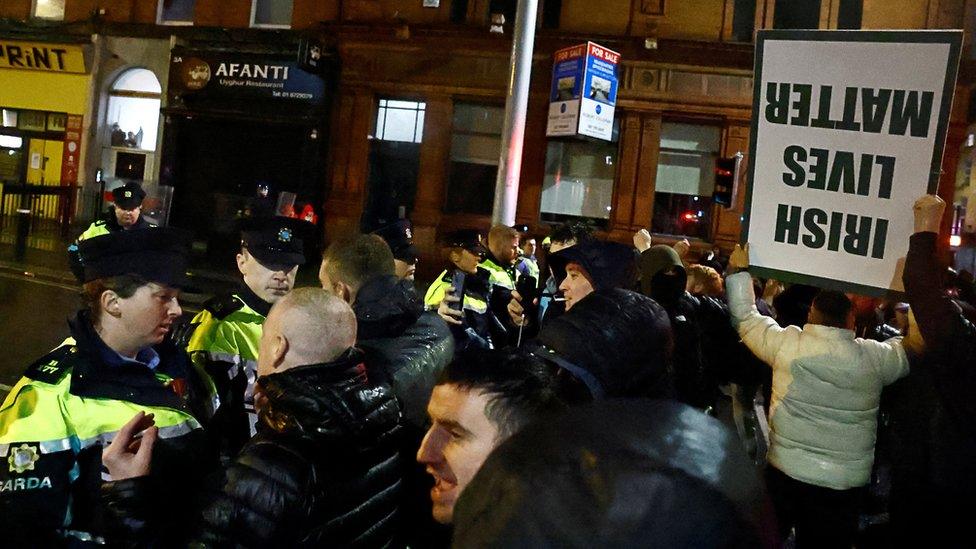
The riot erupted after protesters gathered at a police cordon around the scene of the stabbings
The Association of Garda Sergeants and Inspectors said police in Dublin needed more support and should be supplemented by officers from outside of the city.
Sinn Féin leader Mary Lou McDonald said she has no confidence in Commissioner Harris or Justice Minister Helen McEntee.
She said the "cold, hard truth" was that police "lost control of the centre of our capital city".
"The idea that this violence was unforeseeable is frankly nonsense," she added.
Ms McEntee said she would not be resigning and criticised those calling for Commissioner Harris to resign.
"Anyone who wishes to sow division at a moment in time, when we need to be unified in our response to a group of thugs - they should really think about what their priorities are here," she said.
Briefing other government ministers on Friday night, Ms McEntee said Irish police are trawling through 6,000 hours of CCTV footage and further arrests are "certain".
The taoiseach said the violence had left the nation "unsettled and afraid".
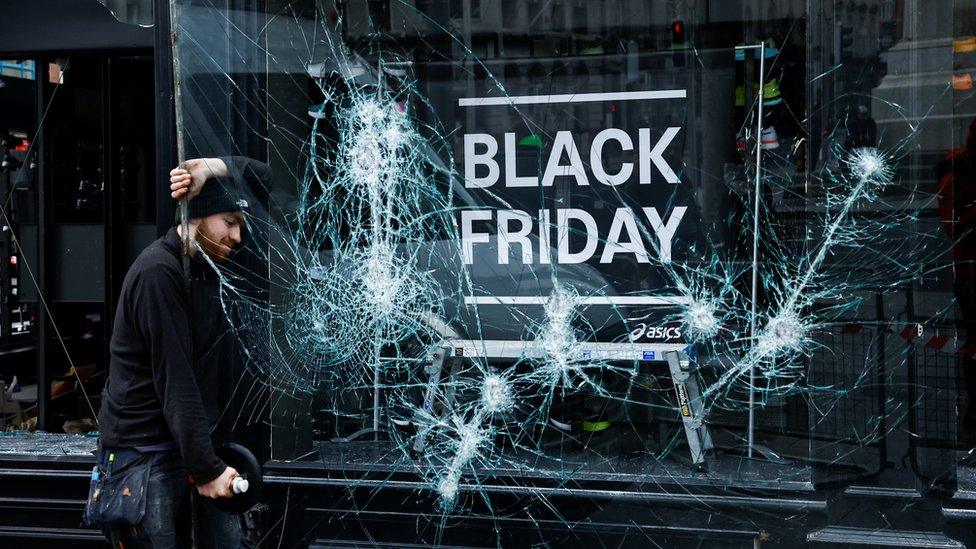
Several shops, including this sportswear store in the city centre, were damaged and looted during the violence
"Yesterday we experienced two terrible attacks - the first was an attack on innocent children; the second was an attack on our society and the rule of law," said Mr Varadkar.
"Each attack brought shame to our society and disgrace to those involved and incredible pain to those who were caught up in the violence."
Mr Varadkar said the rioters' motivation had nothing to do with Irish patriotism.
"Their first reaction to a five-year-old child being stabbed was to burn our city, attack its businesses and assault our gardaí (police officers)," he said.
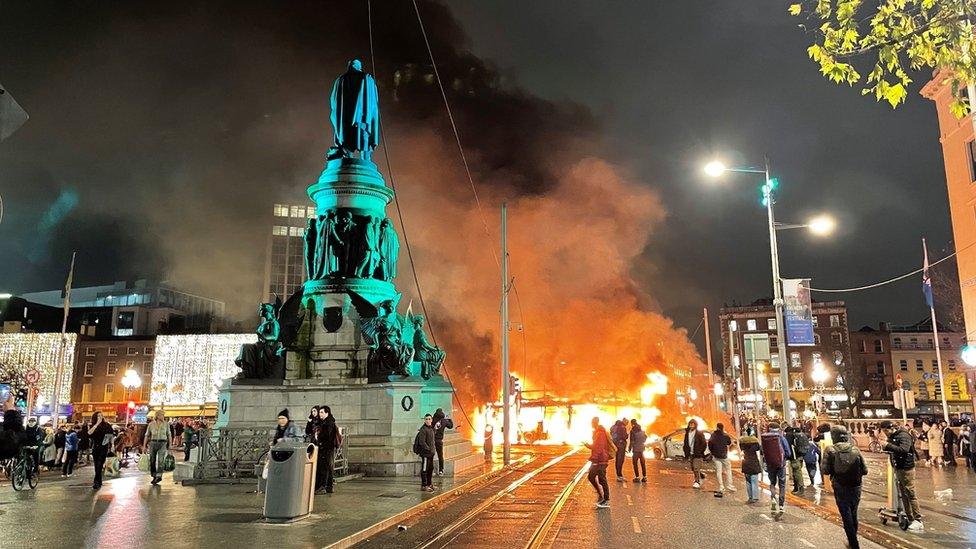
A bus and car were set on fire on O'Connell Street on Thursday evening
The taoiseach vowed to use the "full resources of the law to punish those involved" but added that Ireland's hate crime legislation was "not up to date for the social media age".
Eyewitness Patricia MacBride, who is originally from Londonderry, said many of the rioters were "young people - late-teens, early-20s".
"But what was disturbing was there was an older generation of people egging them on," she told the BBC.
Stabbings motive 'entirely unclear'
The knife attack took place outside Gaelscoil Choláiste Mhuire, a primary school in the city centre, after 13:40 local time on Thursday.
It is understood that a group of young children were lining up when a man carried out the stabbings.
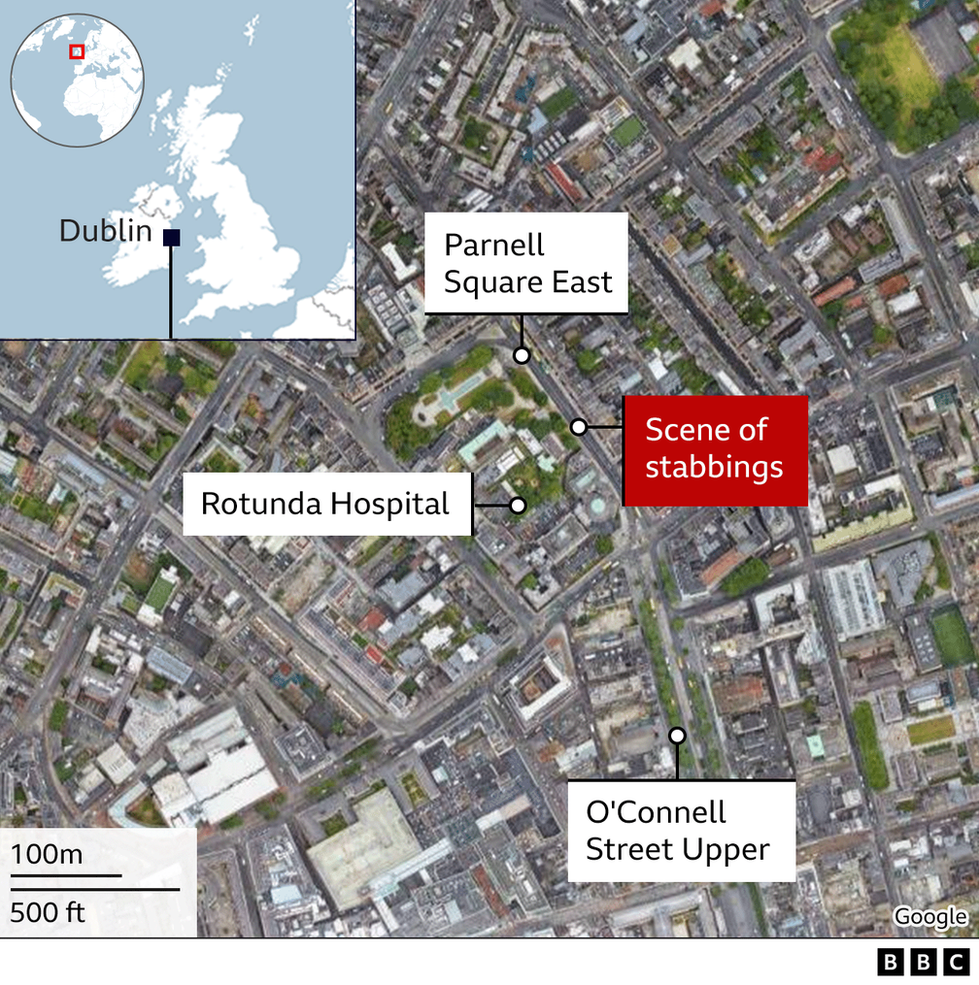
A fast-food courier helped to stop the attack by taking off his helmet and using it as a weapon against the suspect.
"[I] just hit him in the head with all power I have and he fell down," said Caio Benicio, who is originally from Brazil.
Irish President Michael D Higgins condemned the attack and the subsequent disorder, which he said "deserves condemnation by all those who believe in the rule of law and democracy".
Related topics
- Published24 November 2023
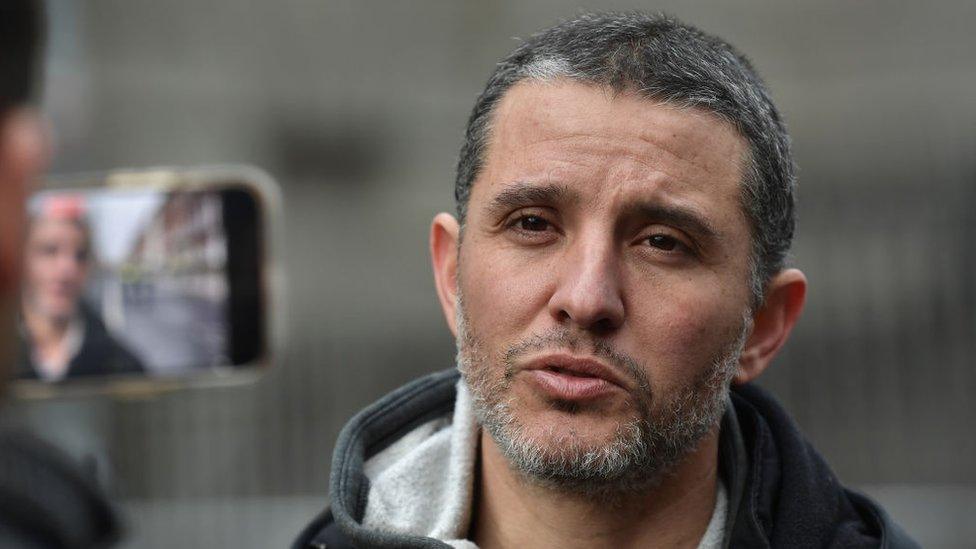
- Published24 November 2023
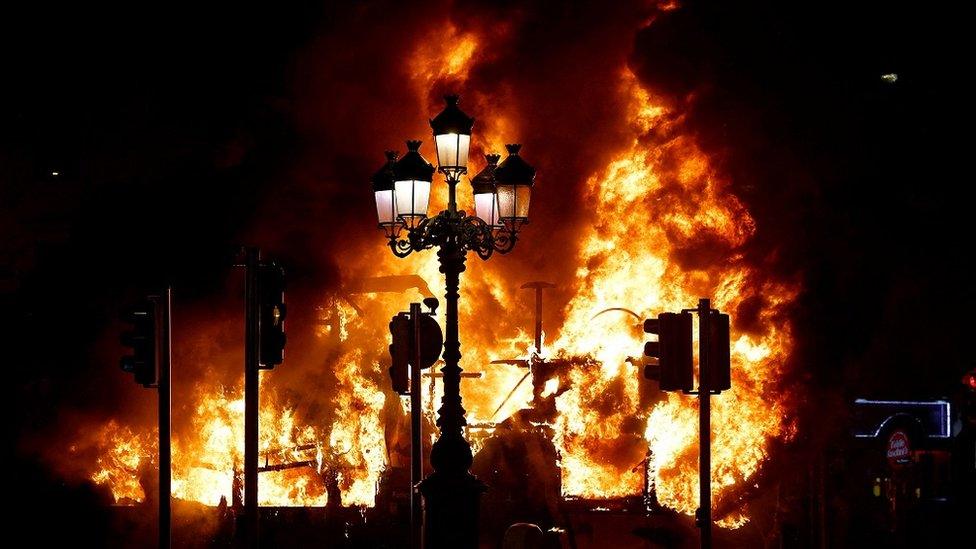
- Published23 November 2023
